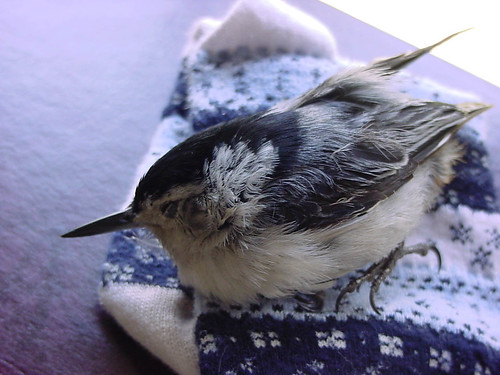I’m sitting at my computer typing with my right hand while my left hand cradles a White-breasted Nuthatch as he dies. An hour ago he was busy doing what nuthatches do, flying and feeding and helping excavate a nest. But in the next hour or so, he’ll be dead thanks to a cat.
When I was a licensed rehabber, people brought me birds hurt by their cats all the time. I never quite knew how to deal with the people. On the one hand, they obviously did care enough to go to the trouble of bringing me the injured ones, but on the other hand, you don’t have to be a rocket scientist to know that cats do horrible damage to birds. I’m too innately polite to scold them, but I do manage to get in some subtle comments about our city’s cat leash law, and how cats kill hundreds of millions of birds nationwide every year. A few people have retorted sarcastically that it doesn’t take a rocket scientist to see that this particular bird isn’t dead thanks to them saving it and bringing it to me. But when people “rescue” a bird from their cat’s mouth, these birds virtually never survive for more than a few days, with or without a rehabber. Sometimes they have internal injuries and bleed to death, as this little nuthatch is doing right now. Sometimes they last a few days before dying of a massive infection.
On TV shows, compassion and skill have at least a chance of winning the day. I wish this were TV. If this were “ER,” I could yell to a nurse to hook him up to an IV and give him 2 units of nuthatch Type A positive blood as I scrubbed and readied myself for surgery. Of course I would have all the equipment and microsurgical techniques one would need to operate on a patient that weighs three-quarters of an ounce. Five nuthatches together weigh less than one quarter pound hamburger patty. The damage a ten-pound cat can do to one is comparable to the damage a 16-ton shark could do to a hundred-and-fifty-pound human. Of course, the largest sharks on record weigh only 15 tons, but let’s not quibble.
Feathers being what they are, most of the damage on a bird isn’t visible except to a discerning and practiced eye. This nuthatch’s tail was ripped out—not just the feathers but skin and muscle and a chunk of the pygostyle, the last fused vertebrae. This damage is irreparable. But the bird’s fluffy tummy feathers cover the damage and nuthatches have a short tail anyway, so the person who brought it to me never even noticed.
I wonder if a tail being ripped out feels anything like that first victim in the movie Jaws as she felt that first tug. Of course, Jaws is fiction. This nuthatch is real. Not even George Clooney’s hands could make him better.
Most people get a false sense of complacency when a bird flies away after their cat toys with it a bit, or if they pull it out of the cat’s mouth and bring it to a rehabber. Do they believe a bird is a mechanical thing that either works or doesn’t? If it can fly away in a panic on sheer adrenaline, it must be okay, right?
I’m the one with blood on my hands, watching the life leak out. In all my years of rehab, I’ve saved only two cat-injured birds, and I know many rehabbers who never saved even one.
This dying nuthatch is making me feel more bitter than usual, because this one wasn’t brought to me by some well-meaning but ignorant person. It was brought to me by a friend—one who I know cares about birds, and one who is certainly aware of my city’s cat leash law. Maybe when she sees her cats looking out the window, she interprets it as a desperate longing for freedom. Maybe she’s tired of hearing them meow at the door. Maybe she’s just tired of cleaning the litter box.
I should have told her that I’m tired, too. I’m tired of explaining over and over that cats are subsidized killers, fed and sheltered by us humans, their population maintained at far higher levels than any natural predators could be. I’m tired of reminding them that cats allowed outdoors have an average life span of less than five years, while indoor cats often live to be 17. And I’m especially tired of witnessing the irregular, weakening gasps of a dying nuthatch, as I watch the sparkle of light in its tiny eyes suddenly dim, as its body shudders one last time, cradled here in my hand.
